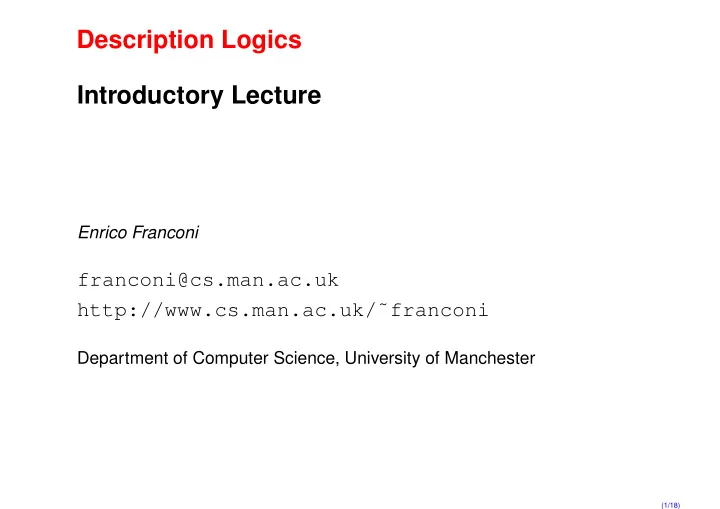

Description Logics Introductory Lecture Enrico Franconi franconi@cs.man.ac.uk http://www.cs.man.ac.uk/˜franconi Department of Computer Science, University of Manchester (1/18)
Administrativia • Class home page: http://www.cs.man.ac.uk/ ∼ franconi/dl/course/2002/ • All relevant information about the course. • Slides, lecture by lecture. • Downloadable reference articles. • Suggested book on logic: • “The Essence of Logic”, by John Kelly. Prentice Hall, 1997. • Various scientific articles on the topic will be referenced during the course. (2/18)
Systems ⇐ ⇒ Agents sensors percepts ? environment agent actions effectors (3/18)
An agent Consider, e.g., the task of designing an automated vehicle: Percepts: video, accelerometers, gauges, engine sensors, keyboard, GPS, . . . Actions: steer, accelerate, brake, horn, speak/display, . . . Goals: safety, reach destination, maximize profits, obey laws, passenger comfort, . . . Environment: US urban streets, freeways, traffic, pedestrians, weather, customers, . . . (4/18)
Rational Agents An Agent as Reasoning module of a Rational Agent. input sentences conclusions World ? User (5/18)
Intelligent Agents • An Intelligent Agent is an entity that perceives and acts according to an internal declarative body of knowledge . • Abstractly, an agent is a function from percept histories and internal declarative knowledge to actions: f : P ∗ × K → A For any given class of environments and tasks, we seek the agent (or class of agents) with the best performance (6/18)
Intelligent Agents • An Intelligent Agent is an entity that perceives and acts according to an internal declarative body of knowledge . • Abstractly, an agent is a function from percept histories and internal declarative knowledge to actions: f : P ∗ × K → A For any given class of environments and tasks, we seek the agent (or class of agents) with the best performance • An Intelligent Agent as Representation and Reasoning module: a logic . • Logic : a well formalized part of agent knowledge and reasoning . (6/18)
Non-Intelligent Agents: Reflex Agents Agent Sensors What the world is like now Environment What action I Condition−action rules should do now Effectors (7/18)
Intelligent Information Agents input sentences conclusions World ? User (8/18)
Intelligent Information Agents input sentences conclusions World ? User The goal of an Intelligent Information Agent is to manage, process, and access Information – e.g., a database system. (8/18)
The Architecture of an Intelligent Information Agent Conceptual Schema Logical Schema Database (9/18)
The Architecture of an Intelligent Information Agent Integrity Constraints Conceptual Schema Logical Schema Database (9/18)
The Architecture of an Intelligent Information Agent Integrity Constraints Conceptual Schema Logical Query Schema Result Database (9/18)
The Architecture of an Intelligent Information Agent Deduction Integrity Constraints Conceptual Schema Logical Query Schema Result Database (9/18)
The Architecture of an Intelligent Information Agent Deduction Integrity Constraints Conceptual Schema Logical Query Schema Result Database (9/18)
The Architecture of an Intelligent Information Agent Deduction Integrity Constraints Conceptual Schema Logical Query Schema Result Database (9/18)
The Architecture of an Intelligent Information Agent Deduction Integrity Constraints Conceptual Query Schema Result Logical Query Schema Result Database (9/18)
The Architecture of an Intelligent Information Agent Deduction Deduction Integrity Constraints Conceptual Query Schema Result Logical Query Schema Result Database (9/18)
The Architecture of an Intelligent Information Agent Deduction Deduction Integrity Constraints Conceptual Query Schema Result Logical Query Schema Result Database (9/18)
The Architecture of an Intelligent Information Agent Agent Deduction Deduction Integrity Constraints Conceptual Query Schema Result Logical Query Schema Result Database (9/18)
The Architecture of an Intelligent Information Agent Agent Deduction Deduction Integrity Constraints Conceptual Query − Knowledge Level ← Schema Result Logical Query − Information Level ← Schema Result Database − Data Level ← (9/18)
Reasoning at the Conceptual Level Italian { disjoint,complete } Lazy Mafioso LatinLover ItalianProf { disjoint } (10/18)
Reasoning at the Conceptual Level Italian { disjoint,complete } Lazy Mafioso LatinLover ItalianProf { disjoint } implies ⇒ LatinLover ItalianProf = (10/18)
Processing Knowledge = “Reasoning” Representation alone is not useful. We want to be able to access represented knowledge and to process it. • access alone is, in general, insufficient • implicit knowledge has to be made explicit ❀ deduction methods • the results should only depend on the semantics . . . • and not on accidental syntactic differences in representations (11/18)
Logic Sentence Sentences Entails Semantics Semantics Representation World Facts Fact Follows A logic allows the axiomatization of the domain information, and the drawing of conclusions from that information. • Syntax • Semantics • Logical inference = reasoning (12/18)
Important Questions • Expressive Power of representation language ❀ able to represent the problem • Correctness of entailment procedure ❀ no false conclusions are drawn • Completeness of entailment procedure ❀ all correct conclusions are drawn • Decidability of entailment problem ❀ there exists a (terminating) algorithm to compute entailment • Complexity ❀ resources needed for computing the solution (13/18)
What is a Logic Clearly distinguish the definitions of: • the formal language • Syntax • Semantics • Expressive Power • the reasoning problem (e.g., entailment) • Decidability • Computational Complexity • the problem solving procedure • Soundness and Completeness • (Asymptotic) Complexity (14/18)
The ideal Logic • Expressive • With decidable reasoning problems • With sound and complete reasoning procedures • With efficient reasoning procedures – possibly sub-optimal (15/18)
Goals of research in the field • Study how declarative knowledge can be formally defined using a logic-based approach. • Give a computational account to it, in order to reproduce it in a computing device. (16/18)
Main topics of the course • review of Classical Logic • Structural Description Logics • Propositional Description Logics • Description Logics and Logics • Description Logics and Databases (17/18)
Conclusions • A warning • Rigorous and formal course (18/18)
Conclusions • A warning • Rigorous and formal course • Two promises • Many examples • Only few main important topics (18/18)
Recommend
More recommend